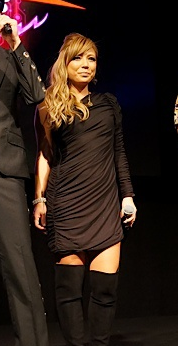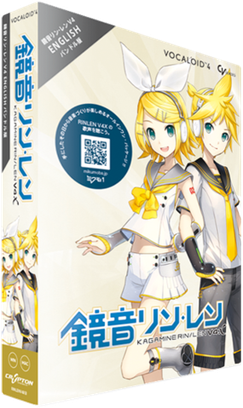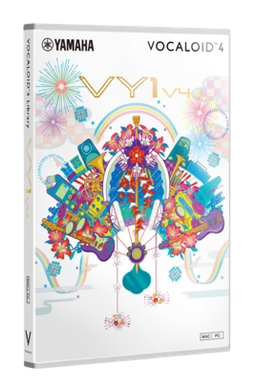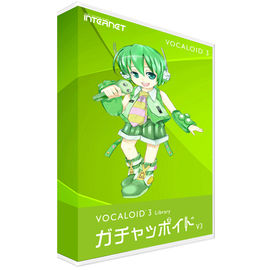
Vocaloid is a singing voice synthesizer software product. Its signal processing part was developed through a joint research project led by Kenmochi Hideki at the Pompeu Fabra University in Barcelona, Spain, in 2000 and was not originally intended to be a full commercial project. Backed by the Yamaha Corporation, it developed the software into the commercial product "Vocaloid" that was released in 2004.

Hatsune Miku, officially code-named CV01, is a Vocaloid software voicebank developed by Crypton Future Media and its official anthropomorphic mascot character, a 16-year-old girl with long, turquoise twintails. Miku's personification has been marketed as a virtual idol, and has performed at live virtual concerts onstage as an animated projection.

Kaito is a Voice Synth developed by Yamaha Corporation for the VOCALOID1 engine, and distributed by Crypton Future Media. He has performed at live concerts onstage as an animated projection along with Crypton's other Voice Synth characters. His original codename was "TARO" back during "Project Daisy", the predecessor of VOCALOID, and was one of the original four known vocals for the project. His voice provider is Japanese singer Naoto Fūga. He was the fifth and final vocal released for the original VOCALOID software, and the second vocal released in Japanese.

Megurine Luka, codenamed "CV03", is a Vocaloid software developed by Crypton Future Media, headquartered in Sapporo, Japan. Its official moe anthropomorphism is a 20-year-old woman. She uses Yamaha Corporation's Vocaloid 2 and Vocaloid 4 singing synthesizer technology. Her voice is sampled from Yū Asakawa. She has performed alongside other Vocaloids at live concerts onstage as an animated hologram projection.
Crypton Future Media, Inc., or simply Crypton, is a Japanese media company based in Sapporo, Japan. It develops, imports, and sells products for music, such as sound generator software, sampling CDs and DVDs, and sound effect and background music libraries. The company also provides services of online shopping, online community, and mobile content.

Internet Co., Ltd. or Internet, is a software company based in Osaka, Japan. It is best known for the music sequencer Singer Song Writer and Niconico Movie Maker for Nico Nico Douga, a video sharing website. It also develops singing synthesizers using the Vocaloid 4 engine developed by Yamaha Corporation. In 2014, they were the second leading company in sound-related software in Japan, boasting a 14.0% share of the market.

Voiceroid is a speech synthesizer application developed by AH-Software and is designed for speech. It is only available in the Japanese language. Its name comes from the singing software Vocaloid, for which AH-Software also develops voicebanks. Both AH-Software's first Vocaloids and Voiceroids went on sale on December 4, 2009.

Yuri Masuda, better known by her stage name yuri, is a Japanese singer, best known as a vocalist of the Japanese band m.o.v.e. She began her musical career at 19 years old in 1996, and released her first song as a solo artist in 1997, the Eurobeat song “PARADISE”, which she released before joining m.o.v.e.
Vocaloid is a singing voice synthesizer and the first engine released in the Vocaloid series. It was succeeded by Vocaloid 2. This version was made to be able to sing both English and Japanese.

Vocaloid 2 is a singing voice synthesizer and the successor to the Vocaloid voice synthesizer application by Yamaha. Unlike the first engine, Vocaloid 2 based its output on vocal samples, rather than voice analysis. The synthesis engine and the user interface were completely revamped, with Japanese Vocaloids possessing a Japanese interface, as opposed to the previous version, which used English for both versions. It is noteworthy for introducing the popular character Hatsune Miku. It was succeeded by Vocaloid 3.

Vocaloid 3 is a singing voice synthesizer and successor to Vocaloid 2 in the Vocaloid series. This version of the software is a much more expansive version, containing many new features, three new languages and many more vocals than past software versions combined. It was succeeded by Vocaloid 4.

Vocaloid 4 is a singing voice synthesizer and successor to Vocaloid 3 in the Vocaloid series. It was succeeded by Vocaloid 5.

Kagamine Rin & Len, officially code-named CV02, are a pair of Vocaloid software developed by Crypton Future Media, headquartered in Sapporo, Japan. Their official moe anthropomorphism consists of a pair of twin vocals, a boy and a girl, respectively named Len and Rin. They use Yamaha Corporation's Vocaloid 2 and Vocaloid 4 singing synthesizing technology. Their voices are samples of the voice actress Asami Shimoda. They have performed at live concerts together, as they are each other's mirror image.

Megpoid is a Vocaloid by Internet Co., Ltd. Her voice is sampled by Megumi Nakajima. The mascot of the software is called Gumi . She is also sometimes called Megpoid GUMI, or GUMI Megpoid.

Gackpoid, is a software product developed by Internet Co., Ltd. for the Vocaloid software. His voice is sampled from Japanese singer and actor Gackt. The mascot of the software is called Camui Gackpo, after Gackt's alias name. Gackpo is also known as Gakupo, and his last name is sometimes spelt as Kamui.

VY1 is a Japanese female vocal developed by Yamaha Corporation and distributed by Bplats, Inc. to act as a "standard" vocal for Vocaloid. It has the codename of "Mizki". It was originally released for the Vocaloid 2 engine.

Gachapoid is a software application based on the character of Gachapin. It was originally developed for Vocaloid 2. The mascot of the software is called Ryuto (リュウト) and he is sampled from the actress Kuniko Amemiya, who is the current voice of Gachapin.

Aoki Lapis is a vocal synthesizer application software program produced by Yamaha Corporation with i-style Project for the software Vocaloid 3. The voice was provided by a contest winner, Japanese actress Nako Eguchi. Aoki Lapis is named after the semi-precious gemstone Lapis lazuli.

Merli (メルリ) was produced by Yamaha Corporation with i-style Project for Vocaloid 3. Her voice is provided by a contest winner, Japanese female, Misaki Kamata. Merli was developed as the elder sister to Aoki Lapis. She is named after the stone "Merlinite", which was the chosen name out of many suggestions put forward by fans of Vocaloid.

















